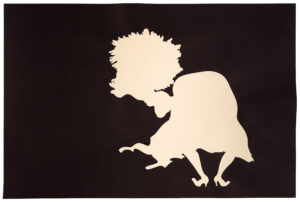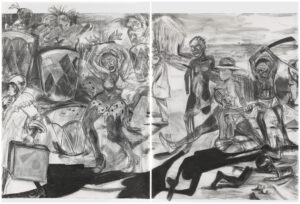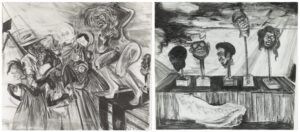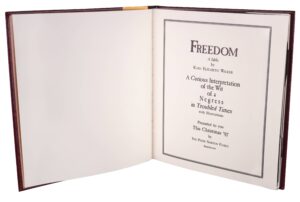Although she studied painting and printmaking at the Atlanta College of Art and the Rhode Island School of Design, Kara Walker is best known for her large-scale, cut-paper installations.
Her silhouettes are a direct reference to a popular art form of the nineteenth century, coincident with slavery. Their violent, often sexual imagery is drawn from folk, literary, and visual traditions. Typically arranged as a series of nonlinear narrative vignettes, they retell the history of racism in America.
The traditional rendering of silhouettes in black and white also reflects racism's visual component. While evoking the past, they efface individual details to create figures that are both stereotypes and archetypes. The artist explains, "The silhouette says a lot with very little information, but that's also what the stereotype does. So I saw the silhouette and the stereotype as linked. Of course, while the stereotype, or the emblem, can communicate with a lot of people, and a lot of people can understand it, the other side of this is that it also reduces difference, reduces diversity to that stereotype."
 Kara WalkerThe Katastwóf Karavan (maquette)2017
Kara WalkerThe Katastwóf Karavan (maquette)2017 Kara WalkerUntitled2004
Kara WalkerUntitled2004 Kara WalkerDaylights (after M.B.)2011
Kara WalkerDaylights (after M.B.)2011 Kara WalkerMuckracking Prophet from the 21st c. Foretells Coming Doom and Encourages the Youth2011
Kara WalkerMuckracking Prophet from the 21st c. Foretells Coming Doom and Encourages the Youth2011 Kara WalkerNo mere words can Adequately reflect the Remorse this Negress feels at having been Cast into such a lowly state by her former Masters and so it is with a Humble heart that she brings about their physical Ruin and earthly Demise1999
Kara WalkerNo mere words can Adequately reflect the Remorse this Negress feels at having been Cast into such a lowly state by her former Masters and so it is with a Humble heart that she brings about their physical Ruin and earthly Demise1999 Kara WalkerFreedom: A Fable (A Curious Interpretation of the Wit of a Negress in Troubled Times)1997
Kara WalkerFreedom: A Fable (A Curious Interpretation of the Wit of a Negress in Troubled Times)1997